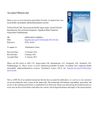 11 citations,
January 2014 in “International Journal of Trichology”
11 citations,
January 2014 in “International Journal of Trichology” Witch hazel-based hair products improved scalp irritation and were well-tolerated.
 35 citations,
May 2012 in “Expert Opinion on Pharmacotherapy”
35 citations,
May 2012 in “Expert Opinion on Pharmacotherapy” The document concludes that there are various treatments for different types of alopecia, but more research is needed for evidence-based treatments.
 22 citations,
August 2017 in “Stem cells and cloning”
22 citations,
August 2017 in “Stem cells and cloning” Stem cell technologies and regenerative medicine, including platelet-rich plasma, show promise for hair restoration in treating hair loss, but more research is needed.
 7 citations,
March 2013 in “Tetrahedron Letters”
7 citations,
March 2013 in “Tetrahedron Letters” New method makes important drug ingredients more easily without needing extra purification steps.
 September 2023 in “IP Journal of Nutrition, Metabolism and Health Science/IP Journal of Nutrition Metabolism and Health Science”
September 2023 in “IP Journal of Nutrition, Metabolism and Health Science/IP Journal of Nutrition Metabolism and Health Science” Recognizing and managing hirsutism, alopecia, and acne is crucial for improving wellbeing in women with PCOS.

Thiolated cyclodextrin-based nanoparticles effectively deliver Minoxidil for scalp treatment without causing skin irritation.
11 citations,
January 2014 in “Mass spectrometry” Silver oxide nanoparticles help detect small molecules effectively.
 7 citations,
January 2018 in “Skin appendage disorders”
7 citations,
January 2018 in “Skin appendage disorders” The document suggests recognizing "trichiatrists" as doctors specializing in hair and scalp health, using evidence-based treatments.
 January 2014 in “Cosmoderma”
January 2014 in “Cosmoderma” The document concludes that personalized treatment plans for hair loss in Asian men are necessary and more research is needed to develop effective guidelines.

Essential oils in a nanoemulsion help hair grow better than minoxidil 2% in mice.
 2 citations,
November 2023 in “Bioactive materials”
2 citations,
November 2023 in “Bioactive materials” New method improves copper peptide delivery for hair growth three times better than current options.
14 citations,
November 2012 in “SLAS discovery” Some herbal extracts can promote hair growth and prevent hair loss.
 May 2023 in “Journal of Clinical Medicine”
May 2023 in “Journal of Clinical Medicine” New understanding and treatments for hair loss are improving, but more research is needed.
November 2022 in “Journal of Investigative Dermatology” Minoxidil and PRP can help convert miniaturized hair follicles back to normal in male pattern baldness.
January 2018 in “Surgical and Cosmetic Dermatology” Latanoprost and minoxidil effectively control hair loss and increase hair count.
 33 citations,
July 2021 in “Clinical, Cosmetic and Investigational Dermatology”
33 citations,
July 2021 in “Clinical, Cosmetic and Investigational Dermatology” Nanocarrier technology in cosmetics improves ingredient delivery and effectiveness while reducing side effects.
 72 citations,
July 2014 in “American journal of clinical dermatology”
72 citations,
July 2014 in “American journal of clinical dermatology” Some treatments, like corticosteroids and sensitizing agents, can help with alopecia areata, but more high-quality research is needed.
 January 2024 in “Journal of Evidence-Based Integrative Medicine”
January 2024 in “Journal of Evidence-Based Integrative Medicine” Teak leaf extract may effectively and safely promote hair growth in males with androgenic alopecia.
 November 2023 in “International Journal of Medical Sciences”
November 2023 in “International Journal of Medical Sciences” New regenerative medicine-based therapies for hair loss look promising but need more clinical validation.
 4 citations,
November 2021 in “Cancers”
4 citations,
November 2021 in “Cancers” The document concludes that understanding and managing hair loss in cancer patients is important, and more research is needed for better treatments.
 3 citations,
April 1989 in “Drug Information Journal”
3 citations,
April 1989 in “Drug Information Journal” Side effects of drugs can lead to the discovery of new treatments.
 August 2012 in “Journal of Evidence-based Medicine”
August 2012 in “Journal of Evidence-based Medicine” Minoxidil helps with hair regrowth in women with androgenic alopecia.
August 2024 in “International Journal of Biological Macromolecules” New gels using cellulose nanocrystals effectively deliver minoxidil to hair follicles, promoting hair regrowth.
 28 citations,
September 2019 in “International Journal of Nanomedicine”
28 citations,
September 2019 in “International Journal of Nanomedicine” Minoxidil nanoparticles can potentially be a more effective treatment for hair growth than current treatments.
 February 2024 in “Archives of Dermatological Research”
February 2024 in “Archives of Dermatological Research” Most patients know about minoxidil for hair loss, but concerns about its use and effectiveness affect their decision to use it.
 October 2019 in “DOAJ (DOAJ: Directory of Open Access Journals)”
October 2019 in “DOAJ (DOAJ: Directory of Open Access Journals)” Minoxidil nanoparticles improve hair growth more effectively than regular minoxidil.
Many hair loss myths lack strong evidence, but some treatments are proven to work.
June 2015 in “Han'gug eung'yong saengmyeong hwa haghoeji/Journal of the Korean Society for Applied Biological Chemistry” Some synthesized peptides improved cell growth better than thymosin β4, VEGF, and minoxidil.
 September 2024 in “PubMed”
September 2024 in “PubMed” Hair loss can be treated based on its type and cause, improving quality of life.
1 citations,
December 2022 in “Journal of Controlled Release” Microneedles could be a better and easier way to regrow hair.






















